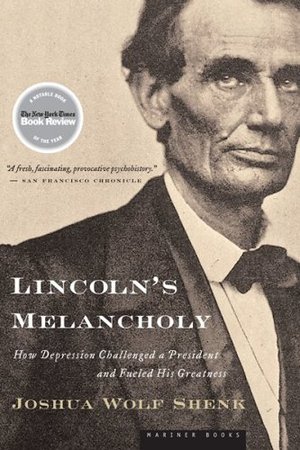 Most people know a few things about Abraham Lincoln: he was president during the Civil War; he “freed the slaves”; he made a killer speech at Gettysburg. But what most contemporary readers don’t know is that Lincoln was a profoundly melancholy man. Throughout his life he endured several major depressive episodes and suicide watches. Yet he led a country through one of its most challenging times. How is this possible?
Most people know a few things about Abraham Lincoln: he was president during the Civil War; he “freed the slaves”; he made a killer speech at Gettysburg. But what most contemporary readers don’t know is that Lincoln was a profoundly melancholy man. Throughout his life he endured several major depressive episodes and suicide watches. Yet he led a country through one of its most challenging times. How is this possible?
Lincoln’s Melancholy: How Depression Challenged a President and Fueled His Greatness is an attempt by author Joshua Wolf Shenk to show readers Lincoln’s personal struggles, how he coped, and how both sides of his personality — the melancholy and the cheerful — made him a great leader.
Lincoln, Inside Out
Although I’ve never been told directly, I learned at a young age that cheerfulness and extroversion are better than sadness and introversion. I’ve dealt with anxiety all my life, and it wasn’t until I started therapy a couple years ago that I heard the words, “It’s okay to be anxious” and “It’s okay to be sad” in relation to my internal struggles. Until then I’d always gotten the impression that I needed to fight those emotions, that I needed to be cheerful and calm when all I wanted to do was scream and cry.
That’s why I’m so glad that books like Lincoln’s Melancholy and Pixar’s newest smash success Inside Out exist. They both give credence to the idea that a one-dimensional personality and experience lead to a one-dimensional, less meaningful existence.
For Abraham Lincoln and Riley Anderson, it’s at the intersection of emotions where they find their greatest strength. For Lincoln in particular, it was critical for him to learn coping mechanisms for balancing the darker and lighter aspects of his personality.
A lesson worth remembering
I’ve liked Lincoln since reading Team of Rivals in 2013, and it has been so good to learn that a man I respect dealt with some of the same problems and still managed to be a good, successful person.
Lincoln didn’t bury those feelings, he didn’t ignore them. He let himself be miserable, dwell on the negative, and brood by the fire. And then he shook it off with a joke or a good book and got the fuck on with his life. He knew he needed to have those moments, talk about them openly with friends, and ultimately be able to set them aside in order to do his job.
I started reading Shenk’s book in early June, a few weeks into a pretty rough time period. There were multiple times when I found myself sinking into depression and anxiety. Worst-case scenarios zoomed around my head like a stunt motorcyclist in one of those round cages.
Normally I fight these feelings by stuffing them down and trying to ignore them — generally a bad idea, since I can only cram so many feelings in before they explode and I have a major meltdown.
But each time I felt these feelings bubbling to the surface, I took a page from Lincoln’s book and just…let them happen. I let myself cry, let the worst thoughts fly through my head. Then I made the decision to come back, to get up and get on with my day. My depressed and anxious thoughts never went away fully, but I was able to set them aside and focus on other things.
A great read
Personal connections aside, Lincoln’s Melancholy is a great book. Shenk looks at multiple primary resources to discover when Lincoln had his worst episodes, and considers the events that could have triggered them.
He also writes about psychology and how the cultural environment of the time meant that it wasn’t a big deal to elect a president who was known to be depressed and sometimes suicidal.
Then of course Shenk looks at the bigger question: did Lincoln’s darker nature, and his methods of combatting those tendencies, actually make him a stronger person and leader?
Lincoln’s Melancholy is a fantastic read for history and psychology buffs, as well as those who are fighting the twin challenges of depression and anxiety. Get a copy right now!






